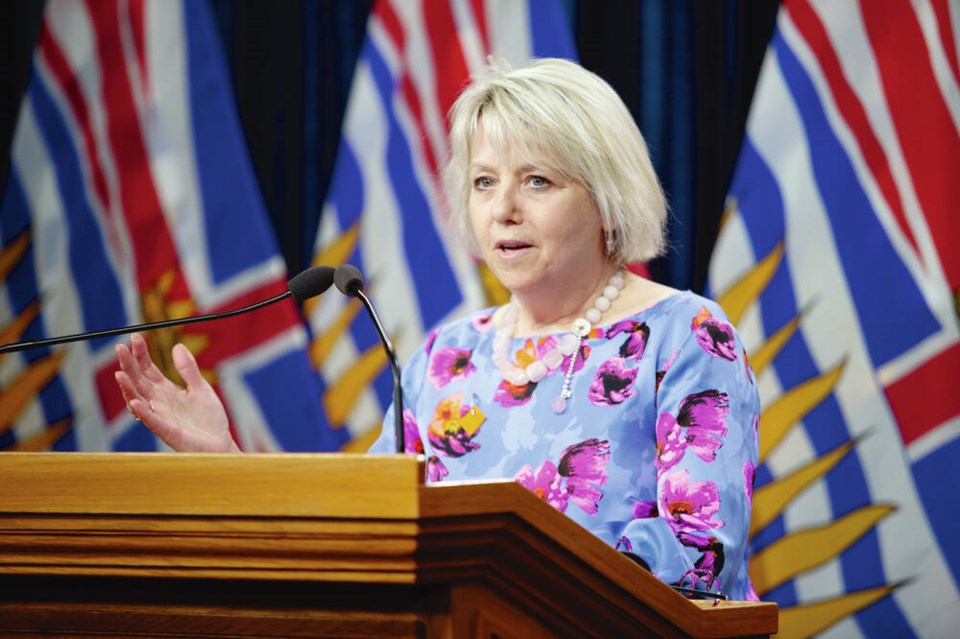B.C.’s provincial health officer says it’s unlikely a new COVID‑19 variant will emerge but she’s concerned the province could see a surge in both the virus and the flu in the late fall.
In a modelling update from Vancouver on Wednesday, Dr. Bonnie Henry noted that an Omicron surge in Australia and New Zealand was paired with the early onset of influenza with a severe peak.
The worst-case scenario is that B.C. will face a COVID-19 surge in November and December, amid waning immunity for some people, that coincides with an influenza surge, said Henry. That could affect hospital capacity, something for which the province is planning.
On the positive side, Henry doesn’t expect a new variant of COVID-19 to emerge in the fall. The highly transmissible Omicron strain has had the longest run of all the variants, persisting for about 10 months. The subvariants of Omicron may change — BA.1 was overtaken by BA.5 and BA.5.1 and now BA2.75 and BA.4 are returning — but the mutations are all within the same variant of concern and within the same genetic code linked to Omicron, she said.
“It’s very unlikely that we are going to be facing, in the next few months, an unknown or rapidly progressing new variant that escapes immunity from vaccination or previous infection and is more infectious than what we’re seeing right now,” she said.
There is concern, however, that additional activity, including travel and gatherings, will result in the return of respiratory viruses that haven’t been prevalent in the last few years, Henry said.
Public-health experts are most concerned about respiratory infections that are particularly challenging for children, including respiratory syncytial virus, commonly called RSV, as there is no vaccination for it.
Modelling used to prepare the health-care system for the fall COVID and flu season projects up to 700 additional patients hospitalized over the coming months. The worst-case scenario presented would see 1,500 additional beds required from late fall through early spring.
B.C.’s overall hospital capacity is approximately 9,400 patients on a daily basis.
Health Minister Adrian Dix said the province has to plan for about 1,200 additional patients, which means bed-management plans are underway. For instance, about 1,300 patients currently in hospital across the province could be cared for in the community, said Dix, and 500 are awaiting care-home placement.
In the worst-case scenario, service reductions and postponing surgeries would be necessary, according to the Health Ministry.
“I want to emphasize again that all of us have some power and some control over that,” said Dix. “You can get immunized against influenza, immunized by bivalent vaccine against COVID 19.”
Henry said she hopes hospitalizations can be minimized if British Columbians ensure they are fully vaccinated and follow public-health advice, such as staying home when sick, masking, keeping gatherings small, ensuring areas are well-ventilated, and regularly washing their hands.
Henry urged people to get their COVID immunizations as soon as they receive a invitation from the province to do so, as well as influenza vaccinations when they become available in October. Both shots are available through public-health clinics and pharmacies.
Flu shots are free for everyone age six months and older. Those age 65 and older will be offered influenza vaccines that provide additional protection — Fluzone for seniors in long-term care and assisted living and Fluad for seniors living in the community.
The recommended interval for COVID-19 vaccine booster doses for those five and older is six months from the last vaccine, three months since the last infection for people who are vaccinated, and as soon as possible for people who have been infected but remain unvaccinated.
Research shows someone who is not vaccinated against COVID‑19 is four times more likely to be hospitalized and require critical care if they contract the virus, said Henry, who noted the bivalent booster is now available for everyone over the age of 18. The bivalent vaccine combines the original COVID-19 Wuhan variant with the Omicron BA.1 subvariant.
Invitations for the bivalent booster have been going out for the last month, as those who got their boosters in the spring come due for their fourth shot.
Most of the population has some immunity to COVID-19 through vaccination or infection, said Henry, noting about 60 per cent of Canadians have been infected by the virus.
Findings by age group show children have fewer vaccine-induced antibodies and more infection-induced antibodies, while older adults have fewer infection-induced antibodies but more vaccine-induced antibodies.
Currently, 58 per cent of eligible children ages 5 to 11 have received their first dose of the COVID-19 vaccine, 88 per cent of British Columbians age five and older have received two doses, and 57 per cent of those age five and older have received a booster, or third dose, according to the Health Ministry.
On Tuesday, 358 people tested positive for COVID-19 while in hospital, said Henry.





.jpg;w=120;h=80;mode=crop)